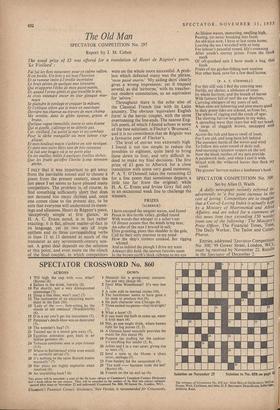The Old Man
The usual prize 'Le Viedlard' : of E5 was offered for a translation of Henri de Regnier's poem,
J'ai fui les flocs mouvants pour ce calme vallon. 11 est fertile. Un bois y est tout !'horizon Et sa rumeur imite a l'oreille incertaine Le bruit adrien de quelque mer lointaine Qui m'apporte l'echo de mon passe marin. Et, quand l'orme gemit et que tremble le pin. Je crois entendre encor en leur glauque mur-
inure Se plaindre le cordage et craquer la mature, Et l'oblique sillon que je trace en marchant Derriere ma charrue au travers de mon champ Me semble, dans la glebe epaisse, grasse et brune, Quelque vague immobile, Merle et sans ecume Qui se gonfle, s'allonge et ne deferle pas. Car, vieillard, quitte la mer et ses combats Pour la !ache tranquille oft mon labeur s'ap- plique.
Et mon houleux matin s'acheve en soir rustique. Et dans mes noirs filets tant de lois recousus J'ai fait une bespce ou je ne porte plus En ses mollies, ,ales a quelques feuilles seches. Que les fruits qu'oure l'herbe a ma terrestre peche.
I FELT that it was important to get away from the inevitable sonnet and to choose a poem from the present century, since the last piece I set seems to have pleased many competitors. The problem is, of course, to find something sufficiently short that does not demand too many rhymes and, once one comes close to the present day, to be sure that everyone will understand its mean- ings and allusions. Henri de Regnier's piece, `deceptively simple at first glance,' as H. A. C. Evans noted, is in fact rather exacting; it is flat, almost matter-of-fact in its language, yet its two sets of triple epithets and its three corresponding verbs in lines 11 to .13 demand as much of the translator as any seventeenth-century son- net. A great deal depends on the solution at this point, and even more on the clinch of the final couplet, in which com retitors were on the whole more successful. A prob- lem which defeated many was the phrase, 'mon passe marin."My sailing days' clearly gives a wrong impression; yet it trapped several, as did 'airborne,' with its treacher- ous modern connotation, as an equivalent for `aerien.'
Throughout there is the echo also of the Classical French line with its Latin ancestry. The obvious 'equivalent English form' is the heroic couplet, with the sense overrunning the line-ends. The nearest Eng- lish poem, of which I found echoes in some of the best solutions, is Flecker's 'Brumana'; and it is no coincidence that de Regnier was a favourite poet of Flecker's.
The level of entries was extremely high. I found it not too simple to reduce the possibles to eighteen, quite hard to bring these down to four, and very difficult in- deed to make my final decisions. The first prize of £3 goes to Alberick for a close translation with some very good moments; P. A. T. O'Donnell takes the remaining £2 for a fine poem that sometimes departs a little too far from the original; while H. A. C. Evans and Irvine Gray fail only in an occasional weak line to challenge the winners.
PRIZES
(ALBER1CK)
I have escaped the unquiet waves, and found Peace in this fertile valley, girdled round With woods that whisper to a sailor's ear Of distant oceans that the winds bring near, An echo of the seas I braved in sail; Elms groaning, pines that shudder in the gale, Call by their salty murmur to my mind How the ship's timbers creaked, her rigging whined.
And as behind the plough I drive my team Athwart this field, the uneven furrows seem In the brown earth's thick richne s to m e e As lifeless waves, unmoving, swelling high, Passing, yet never breaking into foam. An old man now, I have at last come home, Leaving the sea I wrestled with so long For labour's peaceful round, lift's evensong After youth's stormy prime. From the black mesh
Of oft-patched nets I have made a bag, that fresh Fruits of my garden-fishing now receives Nor other haul, save for a few dead leaves.
(P. A. T. O'DONNELL)
For this still vale I fled the coursing seas. Fertile, my choice; a sibilance of trees Its whole horizon; and the breath of leaves With faintest fall of surf the ear deceives, Carrying whispers of my years of sail. When elms are labouring and pine-masts quail In their green tides are echoed, as from far, The whine of rigging and the creak of spar. The slanting furrow lengthens in my wake, A spreading wave that rears but will not break. A surge of sluggish brown, uncapped with foam.
Across the rich and heavy swell of loam. For I am old, and long have left behind The ceaseless battle of the waves and wind To follow this calm round of daily toil, And morning's tempest vespers on the soil. Now the black meshes of my nets provide A patchwork sack; and when I cast it wide Mixed with the withered leaves that fleck MY trawl The grasses' harvest makes a Iandsman's haul.


































 Previous page
Previous page